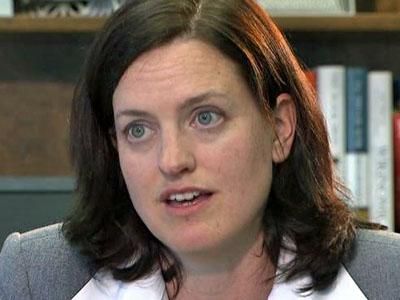Cowell: NC has no room to bond unemployment debt

State Treasurer Janet Cowell said Wednesday that North Carolina should steer clear of any plan to issue bonds in order repay $2.4 billion borrowed from the federal government to pay unemployment claims.
Plans to repay that debt, racked up during the recession of the past five years, are among the first finance bill expected to move during the General Assembly session that begins on Jan. 30. Current plans to repay the debt include both increasing the tax businesses pay to fund the unemployment system as well as cutting benefits for future unemployed workers.
One option that has been discussed off-and-on has been issuing bonds to repay the debt all at once. That option has not been included in any of the packages currently heading to the legislature, but still gets discussed from time to time. It could come up again because changes to federal laws limit changes states can make to their unemployment systems.
"Right now that is a debt between private sector businesses and the federal government," Cowell told reporters at a round-table session hosted by UNC's journalism school. "It is nothing the state has ever voted on...there has been proposals that we take that into a state bond, essentially using the state's balance sheet."
Cowell said that's a bad idea.
"You would increase the state's debt by 50 percent, you would catapult over our traditional debt limits and you would taking on a liability that you don't really have to take on directly. And the benefits of that in the short term are not so much," Cowell said.
North Carolina will have about $500 million of "debt capacity" when the state formally releases a study on the topic later this spring, Cowell said. Although the state can go to the markets for more, North Carolina typically limits the amount it borrows based on calculations of its overall budget and GDP.
Cowell told reporters that the $500 million doesn't represent a huge amount of room to take on new debt, but could be useful in addressing repair and renovation needs cited by Gov. Pat McCrory.
Still, she said, "There's an infinite amount of need and limited capacity."
That could drive the state to find more "niche revenue sources," such as toll roads, Cowell said.
Tax reform and long-term liabilities
One of the biggest policy discussions of the year is likely to center reforming the state's tax system.
Cowell was asked several times whether she favored a GOP-floated plan that would eliminate corporate and personal income taxes in favor of higher sales taxes applied to more items.
The Democrat did not directly say she would or would not back such as scheme, but said the bond rating agencies like to see states tap a number of different sources.
"The rating agencies, in general, look for a diversified systems so you don't have a huge amount of volatility or an over-reliance on just one type of revenue," Cowell said. She pointed out that he own tax proposal, issued in 2011, would have lowered but not eliminated income taxes.
Pressed on whether she might speak out against a tax plan that relied solely on sales tax, Cowell said that was possible.
"Yeah, potentially," she said. "If it comes to a point where you can see we're doing some things harmful to a bond rating I would certainly be raising my hand."
Cowell oversees both the state pension plan and the medical plan for state workers and retirees. Some lawmakers worry these two benefits represent large unfunded liabilities.
Regarding the pension system, Cowell said that it was in good shape relative to other systems. She said that proposals moving it from a defined benefit plan to a "defined contribution" plan – much like a 401(k) – would not save the state a lot of money.
"For the first 10 years, it would be more expensive," she said.
The state medical plan is more problematic, she said.
"When I met with (Gov. Pat McCrory), it was one of the first conversations we had," Cowell said.
The state's long-term unfunded health care liability is $29 billion over the next several decades, Cowell said. Still, she said, the state should be able to better manage the plan, take advantage of changes to federal law and use a $700 million reserve to avoid short-term shortfalls.
"It's not something that's going to occur overnight...It would be folly to rush out and start thinking we have to pay it down tomorrow," she said. "There are so many ways that you can redesign your health program, which is what we're trying to do to address some of those concerns, that it will hopefully never come home to roost."










